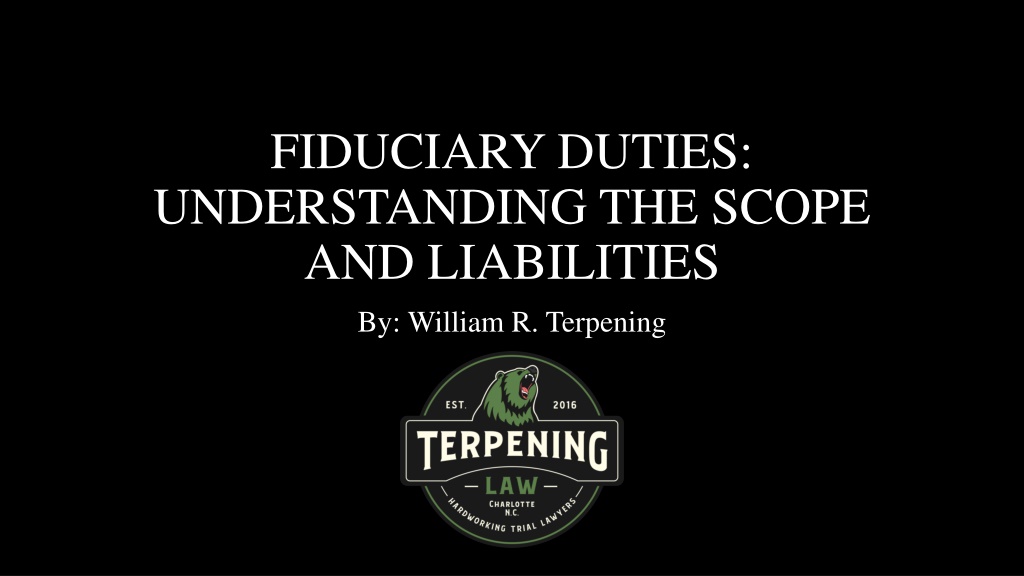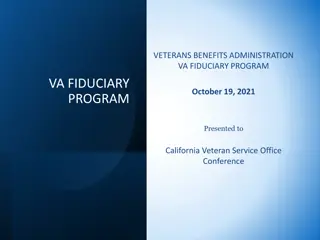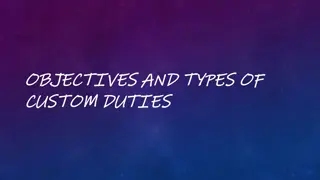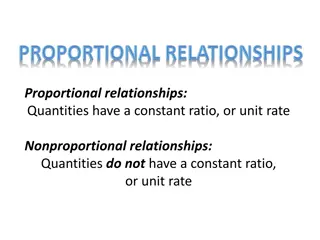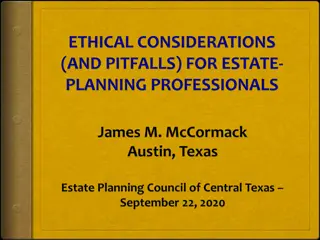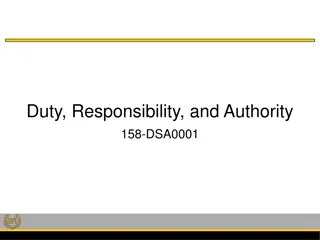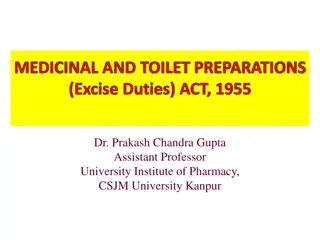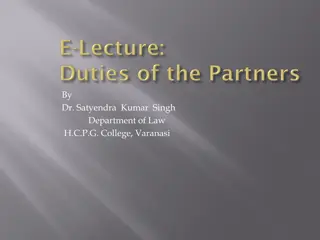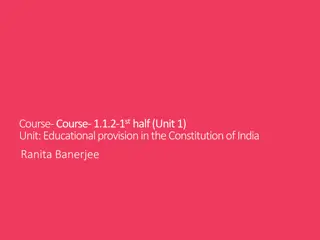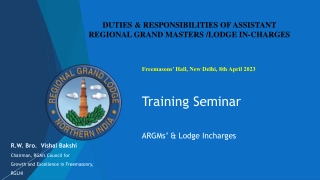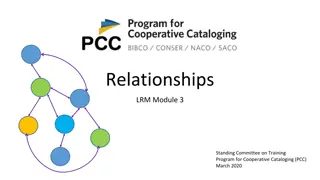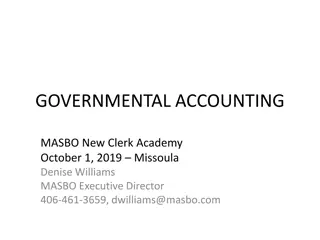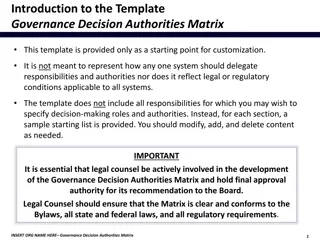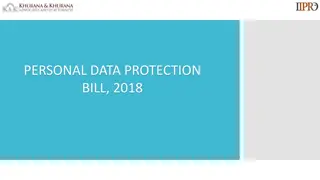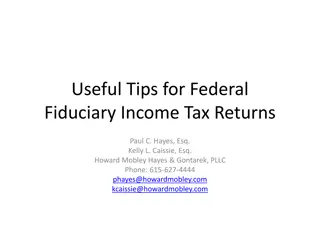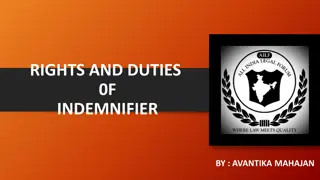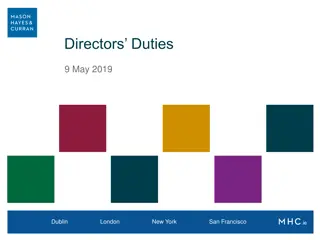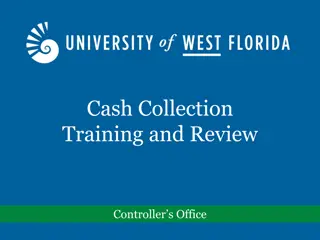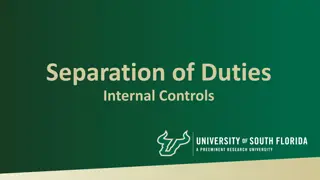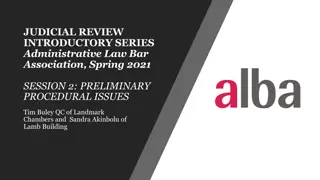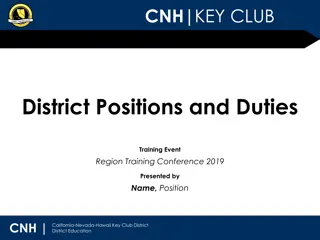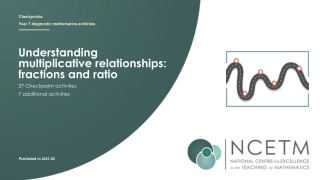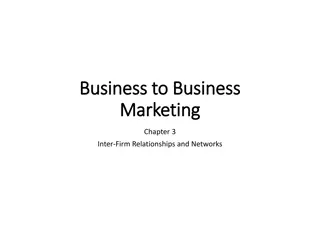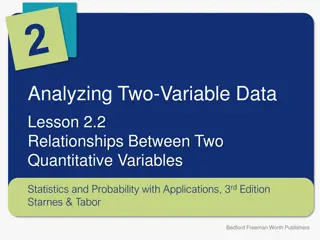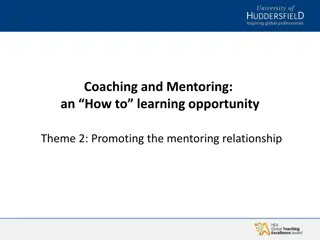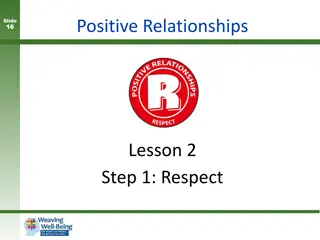Understanding Fiduciary Duties and Relationships
Exploring the scope, liabilities, and establishment of fiduciary relationships under law and through de facto circumstances. Emphasizes the importance of acting in good faith and putting the client's interests first.
Download Presentation

Please find below an Image/Link to download the presentation.
The content on the website is provided AS IS for your information and personal use only. It may not be sold, licensed, or shared on other websites without obtaining consent from the author. Download presentation by click this link. If you encounter any issues during the download, it is possible that the publisher has removed the file from their server.
E N D
Presentation Transcript
FIDUCIARY DUTIES: UNDERSTANDING THE SCOPE AND LIABILITIES By: William R. Terpening
FIDUCIARY RELATIONSHIPS, DUTIES, and REGULATIONS
Basics: Definitions A fiduciary relationship exists where there has been a special confidence reposed in one who in equity and good conscience is bound to act in good faith and in due regard to the one reposing confidence. It is not necessary that there be a technical or legal relationship for a fiduciary relationship to exist. The fiduciary relationship extends to any possible case in which a fiduciary relationship exists in fact, and in which there is confidence reposed on one side, and resulting domination and influence on the other.
Two Ways to Establish Fiduciary Relationships: By Law De Jure. By operation of law. Specifically recognized relationships, such as attorney-client, and principal- agent. North Carolina recognizes certain de jure fiduciary relationships which arise as a matter of law because of the nature of the relationship, such as attorney and client, broker and principal, executor or administrator and heir, legatee or devisee, factor and principal, guardian and ward, partners, principal and agent, trustee and cestui que trust.
Two Ways to Establish Fiduciary Relationships: From Facts De Facto. Based on the facts and circumstances. Arise from facts and circumstances establishing a special confidence reposed in one who in equity and good conscience is bound to act in good faith and with due regard to the interests of the one reposing confidence. Courts don t adopt a rigid definition of a fiduciary relationship, so the relationship can arise in various circumstances and stem from varied and unpredictable factors. Courts don t define the term fiduciary and won t exclude any relation that may exist with respect to the rights of people or property. It need not be legal; it may be moral, social, domestic or personal.
Guiding Principle: Put Your Client First Fiduciaries must act in good faith and can never paramount their personal interest over the interest of those for whom they have assumed to act.
Trustees and Executors Trustees and executors act in a fiduciary capacity. See N.C. Gen. Stat. 32-2(a): Fiduciary includes a trustee under any trust, expressed, implied, resulting or constructive, executor, administrator, guardian, conservator, curator, receiver, trustee in bankruptcy, assignee for the benefit of creditors, partner, agent, officer of a corporation, public or private, public officer, or any other person acting in a fiduciary capacity for any person, trust or estate.
Trustees and Executors In North Carolina, a trustee s duties are codified in the N.C. General Statutes Section 36C, also known as the Uniform Trust Code. Similar to North Carolina s LLC Act, but many of the duties can be expanded or curtailed by the express, written terms of the trust. N.C. Gen. Stat. 36C-1-105. Specifically, N.C. Gen. Stat. 36C-1-105 provides that except otherwise provided in the terms of the trust, this Chapter governs the duties and powers of a trustee and a power holder .
Trustees and Executors Statute provides 13 circumstances in which a trust instrument cannot override the statutory duties. Example: The duty of a trustee to act in good faith and in accordance with the terms and purposes of the trust and the interests of the beneficiaries cannot be changed.
Trustees and Executors NC Uniform Trust Code establishes trustee s duties and powers in detail. Some of a trustee s duties include: duty of loyalty impartiality prudent administration control and protection of trust property record keeping duty to inform and report. Note: Even if a trust instrument does not specifically address the duties and powers of the trustee, the North Carolina Uniform Trust Code is applicable by default and imposes duties that could be used as the basis for a breach of fiduciary duty or constructive fraud claim.
Trustees and Executors Particular risks exist for attorneys who serve as executors. A lawyer cannot take extra compensation although he applies his legal skills to the probate process. When a lawyer voluntarily becomes executor, he takes the office cum onere, and although he exercises his professional skill in conducting the estate he does not thereby entitle himself to compensation beyond the amount ordinarily allowed to an executor or an administrator. Rationale: the lawyer/executor should not risk breaching his fiduciary duties by allowing his interests to conflict with his duties as a fiduciary. Does that really make sense? Can we think of examples of real conflict under those circumstances?
Trustees and Executors It has been said that if an executor chooses to exercise his professional skill as a lawyer in the business of the estate, it must be considered a gratuity, and that to allow him to become his own client and charge for professional services would be holding out inducements for professional men to seek such representative places to increase their professional business which would lead to most pernicious results. Lightner, 221 N.C. at 86, 19 S.E.2d at 150. Seems unlikely in real life, but shows how strongly the law wants to keep fiduciaries independent and loyal to those they serve.
Members/Managers of LLCs, Partners, Directors, and Officers: Members and Managers Because LLC s are principally a creature of contract, the operating agreement can impose or eliminate fiduciary duties for members and managers. In this regard, the fiduciary duties owed by corporate directors are not identical to the fiduciary duties owed by an LLC manager. The difference is that an LLC Manager s duties can be contractually changed in the operating agreement. Indeed, the LLC Act and common law will apply only to the extent contrary or inconsistent provisions are not made in, or are not otherwise supplanted, varied, disclaimed, or nullified by, the operating agreement. N.C.G.S. 57D-2-30.
Members/Managers of LLCs, Partners, Directors, and Officers: Members and Managers Aside from what the parties decide to agree to in the operating agreement, or if the operating agreement is silent, North Carolina s default LLC Act imposes fiduciary responsibilities on Managers of LLCs. Managers shall manage the LLC and conduct the LLC's business in accordance with the operating agreement. Each manager shall discharge that person's duties (i) in good faith, (ii) with the care an ordinary prudent person in a like position would exercise under similar circumstances, and (iii) subject to the operating agreement, in a manner the manager believes to be in the best interests of the LLC. In fulfilling these duties, a manager is entitled to rely on information, opinions, reports, or statements, including financial statements or other financial data, if prepared or presented by any person or group of persons the manager believes to be reliable and competent in such matters and the manager does not have actual knowledge concerning the matter in question that makes such reliance unwarranted.
Members/Managers of LLCs, Partners, Directors, and Officers: Members and Managers The statute provides for a good faith defense to liability: manager is not liable to the LLC for any act or omission as a manager if the manager acts in compliance with this section. Under North Carolina law, members of an LLC are treated like corporate shareholders and managers are similar to directors. But again, note that this similarity between shareholders and managers is subject to the caveat that this refers only to the default statutory LLC Act, which can be contractually overridden by the operating agreement.
Members/Managers of LLCs, Partners, Directors, and Officers: Members and Managers The LLC Act imposes additional liability on Managers for improper distributions. No distribution may be made by an LLC if, after giving effect to the distribution, either of the following would occur: (1) The LLC would not be able to pay its debts as they become due in the ordinary course of business[, or] (2) The LLC's total liabilities would exceed the value of the LLC's assets. If that occurs, the Manager who approved the improper distribution is personally liable for the amount of the distribution that exceeds the amount that could have been distributed without violating the Act. However, that liability is mitigated by N.C.G.S. 57D-3-21: Manager is only liable if he did not act in compliance with that provision. In other words, the same good faith protections that apply to Managers actions in general apply to the distribution restrictions.
Members/Managers of LLCs, Partners, Directors, and Officers: Members and Managers For the Members: As a general rule, members of an LLC do not owe a fiduciary duty to one another. But in some circumstances, a holder of a majority interest who exercises control over the LLC owes a fiduciary duty to minority interest members. Still, the LLC Act does not give rise to fiduciary duties between members or by members to the LLC. Members of a limited liability company are like shareholders in a corporation in that members do not owe a fiduciary duty to each other or to the company. Kaplan v. O.K. Techs., L.L.C., 196 N.C. App. 469, 473 (N.C. App. 2009).
Members/Managers of LLCs, Partners, Directors, and Officers: Partners Partners are in a fiduciary relationship with each other as a matter of law: It is elementary that the relationship of partners is fiduciary and imposes on them the obligation of the utmost good faith in their dealings with one another in respect to partnership affairs. Each is the confidential agent of the other, and each has a right to know all that the others know, and each is required to make full disclosure of all material facts within his knowledge in any way relating to the partnership affairs. Business partners are each other's fiduciaries as a matter of law. These duties include providing full information to the partnership, accounting for the use of partnership property, disclosing self-dealing transactions, and remitting profits obtained through transactions affiliated with the partnership's business.
Members/Managers of LLCs, Partners, Directors, and Officers: Partners As with other fiduciary relationships, this has been codified in North Carolina. See North Carolina s Uniform Partnership Act (N.C. Gen. Stat. 59-31 to 73). Partnership Act expressly creates a fiduciary duty: Every partner must account to the partnership for any benefit, and hold as trustee for it any profits derived by him without the consent of the other partners from any transaction connected with the formation, conduct or liquidation of the partnership or from any use by him of its property. Fiduciary duties in the Partnership Act include a duty to provide each other with information: Partners shall render on demand true and full information of all things affecting the partnership to any partner or the legal representative of any deceased partner or partner under legal disability. Partnership books shall be kept, subject to any agreement between the partners, at the principal place of business of the partnership, and every partner shall at all times have access to and may inspect and copy any of them. Partners have broad rights to an accounting of the partnership. Unlike an LLC s operating agreement, a partnership agreement cannot eliminate those enumerated fiduciary duties partners owe to one another as a matter of law. This represents a significant distinction between LLC s and rights and responsibilities of the managers and members of LLCs, which can all be contractually changed in the LLC s operating agreement.
Members/Managers of LLCs, Partners, Directors, and Officers: D & O Officers and directors owe fiduciary duties to their corporations that arise de jure, as a matter of law. Directors of a corporation are required to act in good faith, with due care, and in a manner they reasonably believe to be in the best interests of the corporation. Officers of a corporation owe a fiduciary duty to the corporation and the shareholders.
Members/Managers of LLCs, Partners, Directors, and Officers: D & O Directors are to fulfill their duties to the corporation: (a) in good faith, (b) with the care an ordinarily prudent person in a like position would exercise under similar circumstances, and (c) in a manner the director reasonably believes to be in the best interests of the corporation. N.C. Gen. Stat. 55-8-30(a). A director is entitled to rely on information, opinions, reports, or statements, including financial statements and other financial data, if prepared by: (a) one or more officers or employees of the corporation whom the director reasonably believes to be reliable and competent in the matters presented; (b) legal counsel, public accountants, or other persons as to matters the director reasonably believes are within their professional or expert competence; or (c) a committee or subcommittee of the board of directors of which the director is not a member if the director reasonably believes the committee or subcommittee merits confidence. N.C. Gen. Stat. 55-8-30(b). The duties of officers are the same as the duties of directors.
Members/Managers of LLCs, Partners, Directors, and Officers: D & O If officers or directors breach these fiduciary duties to the corporation, its shareholders can sue them in a derivative action on the corporation s behalf, in which case any damages recovered will flow back to the corporation. Shareholders generally cannot directly sue officers and directors for their share of harm to the corporation. However, individual actions may be prosecuted if the plaintiff can show either (1) that the wrongdoer owed him a special duty, or (2) that the injury suffered by the guarantor is personal to him and distinct from the injury sustained by the corporation itself. Directors are entitled to a good faith defense against liability if they comply with the requirements of the statute. In addition, a corporation s Articles of Incorporation may limit a director s liability.
Members/Managers of LLCs, Partners, Directors, and Officers: D & O Certain types of transactions by officers presumptively are considered a violation of fiduciary duties. Example: Self-interested transactions, such as use of corporate credit cards for personal transactions, are presumed to violate the fiduciary duties of a corporate president under North Carolina law. Conversion of corporate money constitutes breach of an officer s de jure fiduciary duty.
Business Judgment Rule The business judgment rule insulates directors and officers from legal liability for mistakes, presumed to be made in good faith, unless there is sufficiently specific evidence to support otherwise. The rule prevents a court from unreasonably reviewing or interfering with managerial decisions by the business s directors, thereby insulating directors from the hindsight of judicial second guessing of those management decisions. The rule creates the presumption that in making a decision on behalf of the business, the directors acted with due care and in good faith in the honest belief that the action was in the best interest of the business. Absent rebuttal of the initial due care presumption, a decision by loyal and informed directors will not be overturned by a court unless it cannot be attributed to any rational business purpose.
Business Judgment Rule To overcome the presumption of the business judgment rule, the burden is on the plaintiff to show the defendant directors failed to act (1) in good faith, (2) in the honest belief that the action taken was in the best interest of the company, or (3) on an informed basis.
Fiduciary Duties of Professionals: Attorneys, Accountants, etc: Attorneys Additional consequences apply to lawyers who breach their fiduciary duties. When an attorney breaches the duty owed to his client, there is a presumption of fraud. Booher v. Frue, 98 N.C. App. 570, 584 (N.C. App. 1990)(citing N.C. Gen. Stat. 84-13)( If any attorney commits any fraudulent practice, he shall be liable in an action to the party injured, and on the verdict passing against him, judgment shall be given for the plaintiff to recover double damages. )).
Fiduciary Duties of Professionals: Attorneys, Accountants, etc: Attorneys In addition to typical fiduciary duties, every state s Rules of Professional Conduct impose and reinforce duties similar to fiduciary duties. Such Rules obligate the lawyer to duties not just their clients, but others. For instance: NC Rules of Professional Conduct instruct not only that a lawyer should zealously assert [] the client s position and seek[] a result advantageous to the client, but the lawyer must do so consistent with requirements of honest dealing with others. A lawyer cannot counsel a client to engage in conduct that the lawyer knows is criminal or fraudulent A lawyer must keep client information confidential. The rules also strictly limit a lawyer s ability to enter into transactions with clients (Rule 1.8), represent new clients with interests adverse to former clients (Rule 1.8 and 1.9), use information gained from a client against the client (Rule 1.8), and receive gifts from clients (Rule 1.8).
Fiduciary Duties of Professionals: Attorneys, Accountants, etc: Attorneys An attorney may be liable for aiding and abetting his client's breach of fiduciary duty if he actively participates in the conduct constituting the underlying breach of fiduciary duty. Zloop, Inc. v. Parker Poe Adams & Bernstein, LLP, 2018 NCBC LEXIS 16, *44. However, a lawyer or law firm cannot be liable for the representations of a client, even if the lawyer incorporates the client's misrepresentations into legal documents or agreements necessary for closing the transaction, and is not liable if he merely performs the role of scrivener. Schatz v. Rosenberg, 943 F.2d 485, 495 (4th Cir.). For instance, if a lawyer input inaccurate client misrepresentations into a financial statement, the lawyer would not be liable to others.
Fiduciary Duties of Professionals: Attorneys, Accountants, etc: Accountants Accountants do not owe a per se (or de jure) fiduciary duty. We have found no case stating that the relationship between accountant and client is per se fiduciary in nature. Harrold v. Dowd. That does not mean that a fiduciary duty cannot arise in fact, based on the circumstances (de facto). As with lawyers, CPAs are subject to their own rules governing Professional Ethics and Conduct. See N.C. Admin. Code, Title 21, Subchapter 08N Prof. Ethics and Conduct. These rules impose duties of confidentiality with respect to client information, and prohibit conflicts of interest in various areas, including transactions with clients.
Other Fiduciary Relationships: Investment Advisors Investment advisors, under North Carolina law, owe no de jure fiduciary relationship to their clients. Rather, their situation is analogous to that of accountants. The mere assertion of an investment advisor-client relationship or reliance upon [N.C. Gen. Stat. 78C et seq.] does not give rise to a de jure fiduciary relationship. Silverdeer, LLC v. Berton. As with accountants and their clients, any fiduciary relationship would have to be established by facts and circumstances.
Other Fiduciary Relationships One other, but important, observation: The relationship between an employer and employee is not a fiduciary one.
WHEN FIDUCIARY DUTIES ARE IN CONFLICT WITH ONE ANOTHER
Conflicting Fiduciary Duties: Laby The most comprehensive summary we found on the issue of conflicting fiduciary duties is Arthur R. Laby, Resolving Conflicts of Duty in Fiduciary Relationships, 54 Am. V. L. Rev. 1, 75 (2004). As Professor Laby notes, many conflicts arise because fiduciaries act for more than one principal. Trustees administer multiple trusts, lawyers have multiple clients, directors can be on different boards. It can be difficult to decide whose interests, if any, the fiduciary should favor.
Conflicting Fiduciary Duties: Laby Laby compares five alternative approaches: (1) balancing the interests; (2) subordinating mere property rights to rights that are viewed as more compelling, like constitutional rights to liberty, or privileging property rights over other rights; (3) examining the legitimacy of the purported conflict; (4) deciding which interest existed first; and (5) seeking the view of a neutral third party.
Duty of Loyalty Professor Laby also provides a helpful overview of what he regards the chief fiduciary duties: the duty of loyalty and the duty of care. Duty of loyalty as the responsibility to avoid harming the principal and the duty of care, as a responsibility to act diligently. Duties involving loyalty can be simplified and rendered less subject to conflicts with prophylactic rules black and white rules that eliminate conflicts but may cut too broadly and have unintended consequences. For instance, in many instances fiduciaries are blanketly forbidden from engaging in transactions with principals even for a fair price.
Duty of Care With directors and professionals, the duty of care can be quite subjective. Reviewing materials and monitoring delegated activities can help satisfy the duty. Directors need not have detailed knowledge about all aspects of a corporation and lawyers need not press every advantage. Every lawyer and director will handle things differently the standard is to focus on process, using prudence, reasonableness, and acting in good faith. As the restatement of Trusts notes Whether the trustee is prudent in the doing of an act depends upon the circumstances as they reasonably appeal to him at the time when he does the act and not at some subsequent time when his conduct is called in question. Restatement (Second) of Trusts 174 cmt. b (2004).
BREACH OF DUTY CLAIMS, CHALLENGES TO FEES AND COMMISSIONS, DEFENSES
BFD Litigation To prevail on a claim for breach of fiduciary duty, a plaintiff must prove the defendant: (1) owed the plaintiff a fiduciary duty; (2) the defendant breached his fiduciary duty; and (3) the breach of fiduciary duty was a proximate cause of injury to the plaintiff. In North Carolina, a separate but very similar cause of action to breach of fiduciary duty exists called constructive fraud. To prevail on a constructive fraud claim, a plaintiff must demonstrate: (1) a relationship of trust and confidence, (2) that the Defendant took advantage of that position of trust in order to benefit himself, and (3) that Plaintiff was, as a result, injured. Intent to deceive is not an element of constructive fraud. The primary difference between a claim for constructive fraud and one for breach of fiduciary duty is the constructive fraud requirement that the defendant benefit himself (the wrongful benefit element). The statute of limitations for a breach of fiduciary duty claim is generally three years. However, the limitations period can be 10 years if the breach of fiduciary claim can rise to the level of a claim for constructive fraud.
For More Information.. Call us at: (980) 265-1700 Email us at: brock@terpeninglaw.com Find Us on Social Media: www.terpeninglaw.com Facebook: Terpening Law Twitter: @terpeninglaw Instagram: terpeninglaw
